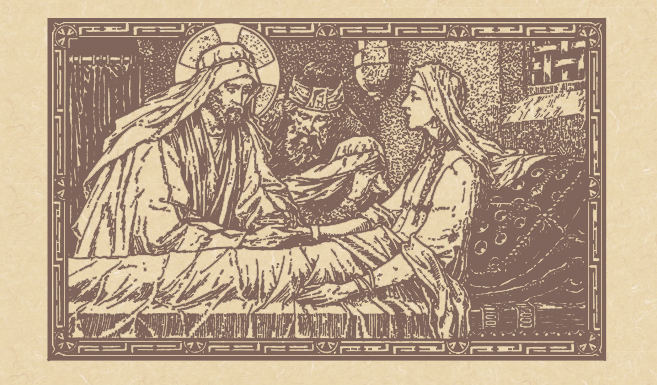Thou Hast Made Us for Thyself, O Lord, and Our Hearts Are Restless until They Rest in Thee.
The Thirteenth Sunday of Ordinary Time.
Lessons from the secondary dominica, according to the ordinary form of the Roman Rite:
• Wisdom 1: 13-15; 2: 23-24.
• Psalm 30: 2, 4-6, 11-13.
• II Corinthians 8: 7, 9, 13-15.
• Mark 5: 21-43.
[or Mark 5: 21-24, 35-43.]
The First Class Feast of the Most Precious Blood of Our Lord Jesus Christ; and, the Commemoration of the Sixth Sunday after Pentecost.*
Lessons from the proper, according to the extraordinary form of the Roman Rite:
• Hebrews 9: 11-15.
• [Gradual] I John 5: 6-8.
• John 19: 30-35.
FatherVenditti.com
|
 1:14 PM 7/1/2018 — The two individuals who seek cures from our Lord—one for herself, and the other for his daughter—are both motivated by a deep faith in the Lord Jesus, and both of them must contend with forces which seek to dissuade them. The Rabbi from the Synagogue must face the despair of reality, when he is told that his daughter is dead and he is too late in summoning our Lord. The woman with the hemorrhage is a particularly interesting case: most Scripture scholars agree that what St. Mark here calls a “hemorrhage” is, in fact, what is referred to in polite society as a “female problem.” The fact that it’s been unchecked for twelve years indicates its seriousness; but, more to the point, it also means that she’s unclean according to Mosaic law, and is forbidden to touch any man under pain of stoning, which puts her attempt to secretly touch the tassel of our Lord’s cloak in a unique perspective. 1:14 PM 7/1/2018 — The two individuals who seek cures from our Lord—one for herself, and the other for his daughter—are both motivated by a deep faith in the Lord Jesus, and both of them must contend with forces which seek to dissuade them. The Rabbi from the Synagogue must face the despair of reality, when he is told that his daughter is dead and he is too late in summoning our Lord. The woman with the hemorrhage is a particularly interesting case: most Scripture scholars agree that what St. Mark here calls a “hemorrhage” is, in fact, what is referred to in polite society as a “female problem.” The fact that it’s been unchecked for twelve years indicates its seriousness; but, more to the point, it also means that she’s unclean according to Mosaic law, and is forbidden to touch any man under pain of stoning, which puts her attempt to secretly touch the tassel of our Lord’s cloak in a unique perspective.
Both she and the Rabbi ignore these hardships because they were not interested in pleasing anyone else's rules.
To put it bluntly, if my primary goal in life is to please our Lord so that I can be saved, then what our Lord requires of me in life cannot be a burden; I will not shy away from what the Gospel requires because it tends toward the ultimate goal that I have set for myself, which is the salvation of my soul. If, on the other hand, I have other motives—my personal comfort, success in my employment, the accumulation of wealth, the satisfaction of my natural urges, or simply the esteem of others—then my faith, even if practiced with regularity and devotion, will still leave me empty and longing, and its obligations will seem burdensome to me, because they do not tend toward that which I have made the focus of my life. And you see this quite frequently among people for whom the practice of their Faith has become a matter of fulfilling obligations:
“Why do I attend Holy Mass on Sunday? Because the Church says I must do so.
“Why do I fast during Lent or abstain from meat on Friday? Because I am required to.
“Why do I marry according to the law of the Church? Because my Church and my family expect it of me.”
And then when a crisis comes in our lives—as it always does—and we turn to our Church to give us solace and answers, we are disappointed to find that it has few to give, not because the Church has failed us or is somehow defective, but because we have failed to invest ourselves in the very purpose of our Church and our faith, which is the salvation of our souls. Our lives are motivated by other things, and one cannot see the destination if one is facing in the wrong direction. Just like the sick woman who touched our Lord’s cloak and was cured: our Lord said to her, “…your faith has saved you” (Mark 5: 34 NABRE), not to suggest that she accomplished this miracle all by herself, but because she threw aside every other concern and risked everything to pursue our Lord, which is what enabled our Lord to help her.
The ultimate goal of man is God. Our one reason for being on this earth is to work out our salvation. Everything else is just passing time. Try as we might to obtain some kind of personal fulfillment by this accomplishment or that goal, what our Holy Father Augustine said so many centuries ago remains true: “Thou hast made us for Thyself, O Lord, and our hearts are restless until they rest in Thee” (Confessions, Book 1, ch. 1).

* In the extraordinary form, the Feast of the Precious Blood (July 1st), being a feast of the Lord of the First Class, displaces the ordinary Sunday, which is commemorated by an additional Collect, Secret and Postcommunion added to those of the feast.
|

